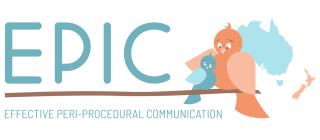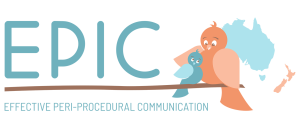How to talk to kids about their operation
Your child needs an operation....
Kids look to you, their carer, for information about the world. The way that you communicate to your child about their operation
will shape their experience.
Children often don’t understand why they need an operation. They will look at you to ‘get a feel’ for what it will be like. It’s really
important that you stay calm and matter-of-fact about the operation. This gives your child the message that that’s how they should
be also.
This resource builds on ‘talking to kids about medical procedures.’
Here are some tips for helping kids feel comfortable about having an operation.

Do’s and Don’ts
These tips might seem a bit odd! They’re explained below!
Do's
Unless your child is very young, you should explain what will happen:
- Start by saying that something in their body needs to be ‘fixed’ or ‘checked’;
- Follow with something like, ‘this will help you feel better’, or ‘stay healthy and strong’
- Use simple, honest and age appropriate words;
- For younger children, less is often more, but every child is different
- Talk about the operation ‘fixing’ something, rather than ‘cutting’ or ‘taking out’
- Focus on the after, how great it will be after it’s fixed, how nice it will be to enjoy a treat
When should I start talking to my child about the operation?
This depends on their age.
Less is more! The more you discuss it with them the more it will seem like a big deal.
Preschool aged children probably only need to know the day before. Older children may need more time.
It’s so important to be honest. If you lie about something and the child finds out they may lose trust in you or in their doctors and nurses.
They might have lots of questions that you don’t know the answer to. Ask the health professionals looking after your child.
- Answer your child’s questions honestly, if you don’t know the answer to a question, tell your child you will ask the doctor or nurse.
- Honesty is key. If you lie about something, your child may lose trust in you or in their doctors and nurses.
- They may have lots of questions that you don’t know the answer to. It’s okay not to know all the answers. Tell your child “That’s a great question, I’m not sure, let’s ask the doctor or nurse about that”.
As parents, being calm and supportive is the best way of making sure your child feels confident and safe when they are having their operation. When they don’t understand what’s happening, they will look at you and if you’re OK then they are more likely to be OK.
I’m really nervous about the operation, what should I do?
● It’s natural for parents to worry because the operation seems like something they can’t control.
● Fake it till you make it – imagine what you would look like if you were calm and then pretend to be just like that, it works a treat and helps you feel better also.
● Breathe out slowly and say to yourself, ‘I am calm’ – this might seem weird but really works.
● When parents are calm, children are calmer too.
- You’ll probably spend some time in a waiting room.
- Bring devices, games, toys, activity books or anything your child likes to do.
- It’s great to give your child some choices about what they bring.
- If your child has a special toy or blanket that is comforting, maybe bring it.
- Your child can also use a distraction or cuddle their toy at the start of the operation, while the anaesthetist gives them a sleepy mask or puts in a drip.
- A game plan (see below) is a great way of giving your child some choices.
- Choices make them feel more in control.
This is an example of how your child can make a game plan, for instance for having a cannula put in.
How to make a game plan:
- You can give your child choices about what they do before the operation, while they go to sleep or after it’s done.
- Make sure all the options are ones that are OK with you.
Before surgery
- While you are waiting to have your operation what activities would you like to bring?
Make a list of questions for the staff if they’ve got any.
Going to sleep for the operation (the anaesthetic)
- When you go to the operating room, which toy are you going to bring?
- While you are going to sleep would you like to hear a story/play a game/listen to music?
After surgery
- What would you like to eat afterwards? (Mostly this can happen as soon as they feel like it.)
This is not a bribe or reward. A little treat can make the event more joyful. Examples include enjoying a favourite meal, movie or game together.
Don'ts
Those “don’ts” are weird, why are they important?
Children are just as influenced by our actions, behaviours and body language as the words we say.
It’s important to communicate calm positivity with our actions as well as with our words.
What you say isn’t as important as how you say it.
The more you talk about it, the more the operation seems like a big deal.
Think about how you would prepare them for a trip to a new place, how often you would discuss it and what your voice sounds like when you talk about it. When you talk about the operation, talk about it the same way as when you prepare them for a trip to a new place.
When we tell people they are brave, we often mean the thing they are brave about is scary. It isn’t helpful to give your child the message that the operation is scary, so it’s better not to use the word ‘brave’.
Telling your child not to worry or that everything will be ok can actually have the opposite effect and give the message that there’s something to worry about.
Words matter. When we say things like ‘it won’t hurt’, often the ‘won’t’ is forgotten and the word ‘hurt’ is what sticks in the brain. To use better words and avoid lying about things like pain and nausea, see the suggestions below in the FAQs.
For the same reasons as above, avoid negative words like ‘don’t’ and ‘won’t’ as they are often used in statements like ‘it won’t hurt’ or ‘don’t worry’.
Parents & Caregivers FAQs
The word ‘anaesthetic’ means medicine that makes a person unconscious, or really deeply asleep.
When someone is unconscious, they don’t feel anything at all that is happening to their body.
Anaesthetic medicines can be given through a drip (a little plastic straw that is put under the skin, also called a cannula or IV) or as a gas, often through a mask put onto the face.
Anaesthetics are given by specialist doctors called anaesthetists, or anaesthetic doctors (kids call us sleep doctors). Their job is to give the anaesthetic medicine and stay with the person having the anaesthetic the whole time they are asleep, making sure they are safe and
comfortable.
Anaesthesia is different for every child. Some children simply close their eyes and fall asleep.
Many have what we call an excitement stage as they’re falling asleep. During this time they can do some odd wriggling, their breathing may sound different and their eyes might roll a bit. It might seem strange to you as a parent but is very normal for the anaesthetic team caring for your child.
During this stage your child is actually anaesthetised, even though they might look a bit awake. They will not remember it. After this stage, your child will relax into a very deep sleep.
Absolutely. Sometimes, the anaesthetic team will do the distraction for you, or you can talk to them, sing or perhaps give them a device to look at. You can discuss this with your anaesthetist beforehand if you like.
There are two different ways that anaesthetic doctors help children go to sleep for an operation.
● Children can go to sleep with a mask on their face. The gases they breathe through the mask help them to fall asleep.
● They can have a small plastic straw (also called a drip, cannula or IV) put in through their skin, into a vein. The doctor then puts medicine into this drip to help them fall asleep.
● If they go to sleep with a mask they will have a drip put in while they are asleep. They won’t be able to feel it go in, they will be asleep. It will still be there when they wake up and the nurses take it out once they have been awake for a while.
It is sometimes possible for your child to choose whether they have the mask or the drip. You can discuss this with the anaesthetic doctor.
Children & Young Adults FAQs
Here are some questions children commonly ask in the lead up to an anaesthetic. And also some suggestions on how to answer them…..
5 year old Evie is having an operation for her broken leg tomorrow.
Dad says to her, ‘Evie, guess what? The doctor said we can fix your leg tomorrow and make it all better. In the morning, we’re going to this amazing place called the hospital. We will have to wait a bit, like we did when we went to the emergency room. Then a doctor will give you this great mask thing that goes on your face. The mask goes on your face for a few minutes and then you have a special sleep. When you wake up, your leg will be all fixed and you get to have an icy pole. And guess what? You get to play games on my phone the whole time we’re waiting and after your leg is fixed we can maybe get takeaway for dinner. What do you want for dinner after your leg is better, pizza or a burger?’
It is often possible to put special cream on the skin where the drip is going to go. The cream makes the skin ‘numb’, which means the child won’t be able to feel very much when the drip is put in. They will still feel some touching but probably won’t feel the sharp feeling of the drip going in. You can discuss this with your anaesthetic doctor or the nurse who you see when you come to the hospital.
You can tell your child something like:
‘The doctor puts a special, tiny little straw into your hand and then puts medicine into it which helps you to sleep. The sleep is a really special sleep, where you don’t feel anything at all. Then you wake up and you’re all fixed!’
If your child is going to sleep with a drip then you can explain that they are having a little straw in their hand. It has a needle in it when it goes in and then when the straw is in the right spot the doctor throws the needle out and then there’s just the little straw left. You can also mention they can have some ‘magic cream’ which helps them to not feel much of what’s happening when the
drip goes in.
If your child goes to sleep breathing on the mask they will wake up with a drip in their hand or foot. It is often wrapped up with a bandage and comes out before you go home. When it comes out it’s like having a large bandaid taken off and while it’s happening you can distract them by playing a game, using a toy or chatting.
This is often something that worries pre-teens and teens.
The anaesthetic sleep is different to normal sleep, so your child won’t wake up like they wake up when someone talks to them or touches them like, for example, when it’s time to get up for school!
The sleep medicine (anaesthetic) is given the whole time they’re having the operation and this keeps them asleep. When the procedure is finished, the anaesthetist stops giving the medicine and your child will wake up as the medicine is cleared from your child’s body.
The whole time your child is anaesthetised, the sleep doctor is watching them, keeping them safe and making sure they are deeply asleep. They can give more or less anaesthetic to get it just right.
Waking up from an anaesthetic feels like waking up from a really good sleep. It can feel like you fell asleep just a second ago and now you’re awake again. It can also feel like you still want to go back to sleep for a while.
Some children are sleepy or even grumpy for a while afterwards but this will wear off.
The anaesthetic doctor and the surgeon will give you medicine to help you feel as comfortable as possible when you wake up. If you are not comfortable enough, we can ask the doctor or nurse for more medicine.
Occasionally this happens after anaesthesia and surgery. The anaesthetic doctor will most likely give medicine during the anaesthetic so that your child’s tummy is as settled as possible when they wake. They can have extra medicine if they need it.
A way of explaining this to your child could be:
“The doctor will give you medicine while you’re asleep which helps you feel like having a drink and something to eat after you wake up. What would you like to have when you first wake up? A drink of water, apple juice or an icy pole? What colour icy pole would you like?”
Focussing on bad experiences from the past can actually make your child feel worse this time.
Explain that this time things can be different, use positive words. You can talk to your anaesthetist about what happened and this helps them tailor the anaesthetic for you this time. For instance, they might give different medicines for nausea and vomiting.
The anaesthetic doctor and anaesthetic assistant will be with you the whole time, keeping you safe and comfortable. After you are asleep, I will be close by in a waiting lounge, ready to be with you as soon as possible afterwards.
You will wake up in the Wake Up Area (Post Anaesthetic Care Unit), after the operation is finished. There will be a nurse looking after you and I’ll be there sitting next to you right after you wake up.
In the Wake Up Area, nurses will look after you, making sure you are safe and comfy. They will call me just as you wake up and I’ll come and sit with you. While you wait for me, you can have your favourite toy or blanket with you to snuggle.
As soon as the nurses are happy that your child is awake, breathing well and that the operation went well, they will call you in.


